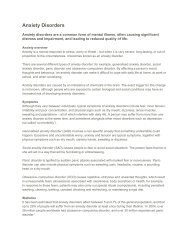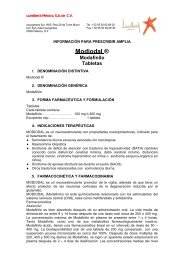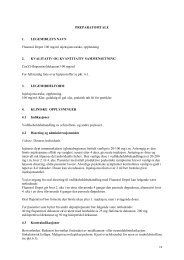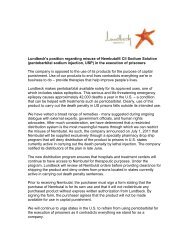Download - Lundbeck
Download - Lundbeck
Download - Lundbeck
Create successful ePaper yourself
Turn your PDF publications into a flip-book with our unique Google optimized e-Paper software.
8<br />
<strong>Lundbeck</strong> Magazine 2009<br />
"Health research is one of<br />
the most profitable activities<br />
a society can invest in"<br />
The European Brain Council<br />
The European Brain Council (EBC) is a<br />
coordinating council formed by European<br />
organizations in neurology, neurosurgery,<br />
psychiatry, basic brain research<br />
(neuroscience), as well as patient<br />
organisations and industry. The EBC<br />
was founded in 2002 in Brussels, and<br />
has offices in Brussels and Florence.<br />
www.europeanbraincouncil.org<br />
No public money for research<br />
Brain diseases are also costly for society. In<br />
fact, they cost as much as heart disease and<br />
cancer put together. In 2004, the cost of brain<br />
diseases in Europe was EUR 386 billion.<br />
“The figure comes from a study that I was<br />
involved in compiling. It revealed that brain<br />
diseases are both more expensive and have<br />
more far-reaching consequences than was<br />
previously thought. But if one looks at the<br />
amount of money that is actually used on<br />
brain research, it is as if this is forgotten.<br />
Migraine, which I specialize in, is a very<br />
expensive disease in socio-economic terms.<br />
It costs European countries EUR 27 billion<br />
annually, but there is almost no public money<br />
to research it. Among the more than 300 PhD<br />
scholarships recently awarded by the Danish<br />
Agency for Science, Technology and<br />
Innovation, there was not one single<br />
scholarship for brain research in Copenhagen.<br />
As a field of study, the brain is not nearly as<br />
prominent as it ought to be,” Jes Olesen says.<br />
High return on investment<br />
However, the EU Commission has in its<br />
Seventh Framework Programme given priority<br />
to brain research for the first time ever.<br />
“This is better than it has been, but I am<br />
disappointed that the strong wording has not<br />
resulted in a similar increase in funds. Health<br />
research is one of the most profitable activities<br />
a society can invest in, and it gives an<br />
enormously high return on investment,” adds<br />
Jes Olesen.<br />
Another problem is the lack of large and<br />
powerful patient organizations on a par with<br />
the Heart Association or the Cancer Society.<br />
“The area of brain diseases is poorly organized.<br />
In Denmark, we have 27 patient organizations<br />
that focus on brain-related issues, but there is<br />
a lack of collaboration between them and<br />
affected persons to lead out in efforts on<br />
behalf of the cause. Persons who have been<br />
cured of heart disease or cancer are frequently<br />
so grateful that they become involved in<br />
volunteer activities – and have the strength<br />
to do so. But no one wishes to step forward on<br />
the basis of a psychiatric diagnosis. In addition,<br />
brain diseases sap patients of their energy to<br />
the point where they must draw on their<br />
meagre reserves,” Jes Olesen explains.<br />
On the rise<br />
And the need for more knowledge and<br />
treatment will continue to rise. Brain diseases<br />
do not merely disappear. Dementia and<br />
migraine are both on the rise in the Western<br />
world, while the situation for psychiatric<br />
diseases is less clear. The only disease in which<br />
progress with certainty is being made is stroke.<br />
“That there are more persons with dementia is<br />
related to the fact that more people are living<br />
longer. But we have no idea why the incidence<br />
of migraine headache is rising. That the<br />
incidence of stroke is not rising by five per<br />
cent annually as statistics indicate it should, is<br />
probably due to better prevention in the form<br />
of medications that lower blood pressure and<br />
inhibit cholesterol formation. And also that we<br />
have become better at warning people to<br />
avoid alcohol and tobacco, or at least to keep<br />
down their consumption, which is also true in<br />
relation to some other brain diseases. Apart<br />
from that, the prevention of brain diseases is<br />
largely uninvestigated,” Jes Olesen says.<br />
PHOTO: Joachim ladefoged










![[Product Monograph Template - Standard] - Lundbeck](https://img.yumpu.com/49015733/1/190x245/product-monograph-template-standard-lundbeck.jpg?quality=85)






